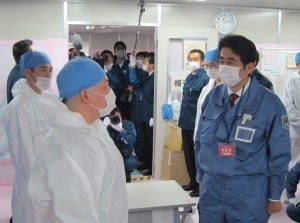Nuclear
-
Nuclear
Hungary Inaugurates Subsurface Repository for Nuclear Plant Waste
Construction of a $310 million repository about 250 meters below Earth’s surface for low- and intermediate-level radioactive waste from the operation and future decommissioning of Hungary’s power plants reached a significant milestone at Bataapati.
-
Gas
Japan Banks on LNG
Japan’s scramble to replace generation lost from nuclear power plants that were shuttered after the March 2011 Fukushima Daiichi nuclear accident has forced it to rely on pricey imports of fossil fuels—and soaring energy costs are hammering the world’s third-largest economy.
-
Nuclear
SoCal Edison Expects SONGS Decision by May
Southern California Edison now expects the Nuclear Regulatory Commission to decide in late April or May whether or not the 2,300-MW San Onofre Nuclear Generating Station (SONGS) Units 2 and 3 may restart in time for this summer’s demand season.
-
Nuclear
Dominion’s Farrell: Low Gas Prices, Lack of Policy Pose Setbacks for Nuclear Expansion
Nuclear power will play a significant role in the nation’s energy future, though a nuclear expansion will be hindered by several factors—foremost among them low natural gas prices and a lack of a comprehensive national energy policy, Dominion Chair, President, and CEO Thomas Farrell II told attendees at the Platts Nuclear Energy Conference in Washington, D.C., on Wednesday.
-
Nuclear
Latest Olkiluoto EPR Delay Puts Project 8 Years Behind Original Schedule
An EPR reactor under construction by an AREVA-Siemens consortium in Finland may not start operating until 2016, two years later than its revised start date in 2014, Finnish utility Teollisuuden Voima (TVO) said on Monday. Construction of the Olkiluoto 3 (OL3) unit began in May 2005, and the new possible start date could put it eight years behind its initial schedule.
-
Nuclear
Progress Energy to Scrap Crystal River Nuclear Plant
The beleaguered Crystal River Nuclear Plant in Citrus County, Fla.—which has been in shutdown and offline since late 2009 due to damage to its containment building—is to be retired, Progress Energy Florida announced on Tuesday.
-
Nuclear
States, Utilities Ask Fed. Court for Expedited Suspension of Nuclear Waste Fees
In a filing with the U.S. Court of Appeals, D.C. Circuit, state utility regulators and nuclear utilities rejected claims in a recent Department of Energy (DOE) filing that Nuclear Waste Fund fees were necessary, and they called on the court to temporarily suspend the fees.
-
Nuclear
Too Dumb to Meter, Part 8
As the book title Too Dumb to Meter: Follies, Fiascoes, Dead Ends, and Duds on the U.S. Road to Atomic Energy implies, nuclear power has traveled a rough road. In this POWER exclusive, we present the 14th and 15th chapters, “A Man, a Plan, a Canal” and “The End of the Exploding Game,” the final two chapters of “Eddie Teller’s Exploding Ambitions” section.
-
Nuclear
THE BIG PICTURE: Nuclear I&C
Progress in electronics and information technology has created incentives to replace traditional analog instrumentation and control (I&C) systems in nuclear power plants with digital I&C systems, or systems based on computers and microprocessors. About 40% of the world’s operating reactors have been modernized to include at least some digital I&C systems, according to the International […]
-
Nuclear
With Fresh Election, Japan Veers Away from Nuclear Phase-Out
A landslide victory handed by Japanese voters to the Liberal Democratic Party (LDP) in mid-December saw power in the country’s Lower House shift back to the nationalist-conservative party that had governed Japan almost continuously since 1955. The LDP had been ousted in a historic defeat only three years earlier. In his first televised interview since taking office, newly elected Prime Minister Shinzo Abe (who previously served as prime minister from September 2006 to September 2007) called for review of plans to phase out nuclear power in Japan by 2030, endorsing instead the construction of new, safer nuclear power plants.



